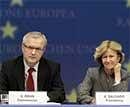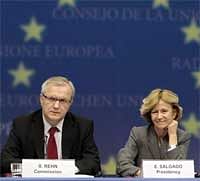

Under the three-year aid plan, the EU Commission will make euro60 billion available while countries from the 16-nation eurozone would promise bilateral backing for euro440 billion. The IMF would contribute an additional sum of at least half of the EU's total contribution, or euro250 billion, Spanish Finance Minister Elena Salgado said.
"We are placing considerable sums in the interest of stability in Europe," she said after marathon 11-hour talks in an emergency finance ministers' meeting. The talks were called on Friday night after a eurozone summit in Brussels amid concerns that the financial crisis sparked by Greece's runaway debt problems had begun to spread to other financially troubled eurozone countries such as Portugal and Spain. The EU's monetary affairs commissioner, Olli Rehn, said the agreement "proves that we shall defend the euro whatever it takes."
"We are facing such exceptional circumstances today and the mechanism will stay in place as long as needed to safeguard financial stability," the ministers said in a statement. Spain and Portugal, which have begun to see the same signs of trouble that Greece had three months, have committed to "take significant additional consolidation measures in 2010 and 2011," the statement said, and the two countries will present them to the EU's finance ministers at their meeting on May 18.
The EU's slow response to the crisis and its failure to keep Greece from reaching the brink of bankruptcy triggered slides in the euro and global stocks last week, and intensified fears the crisis would spread. Ministers had hoped to have something approved by the time stock markets opened on Monday in Asia, but they missed their deadline by a couple of hours.
"We need to make progress today because in the night, when the markets are opening, we cannot afford disappointments," Swedish Finance Minister Anders Borg said as he headed into the meeting last afternoon. "We now see herd behaviours in the markets that are really pack behaviours, wolf pack behaviours," he said. If unchecked, "they will tear the weaker countries apart. So it is very important that we now make progress." Some eurozone nations blamed the fragile governments and a lack of European cooperation for the crisis.